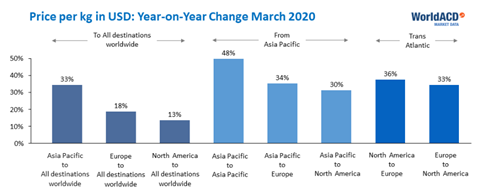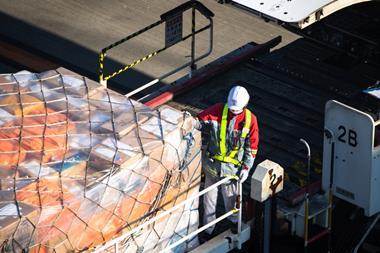The latest figures from WorldACD have confirmed expectations of a near 20% decline in cargo demand in March, but have also highlighted the extent that the industry has increased its use of freighter aircraft since the coronavirus outbreak.
Figures from the data provider show that the number of flights performed with a Boeing 747 freighter in March was 34% higher than in February, while freight carried on this aircraft type increased by 48% (see main image).
The B777F saw a 24% increase in the number of flights performed compared with February, while the freight carried was up by 28%.
For the A330F, WorldACD recorded 18% growth in flight numbers and 30% in cargo carried.
In terms of passenger aircraft operations, the passenger aircraft carrying by far the most freight — the B777F — lost 21% in freight carried. The A330 passenger aircraft lost 36% as airlines cancelled swathes of flights in response to the pandemic.
WorldACD also finalised demand and rate figures for the month. Back in mid April, the data provider said it expected cargo demand to drop by just over 17% year on year in March.
In its final figures released today, WorldACD said the actual decline stood at 19%, while prices rose sharply (see chart below).
Yesterday, IATA March figures showed a 15% decline in cargo traffic in tonne km terms.
"We have all read the stories with anecdotal ‘evidence’ of humongous price increases," WorldACD said. "These stories can now be put in proper perspective, having gone through the full worldwide data of over 70 airlines.
"Of the ten city pairs with the highest price increase ($) between January and March, four were on the North Atlantic. Frankfurt – Beijing topped the list (+122%), while London-New York was number 10 (+75%)."
In the first quarter, cargo carried declined by 9%, WorldACD said.
"The one product category growing was pharmaceuticals (+7%), as the transport by air of fish and seafood was hardest hit (-13%). Belgium was the only one of the Top-50 countries showing growth for each of the three months in Q1, driven by large increases in pharmaceuticals, live animals and dangerous goods."
















